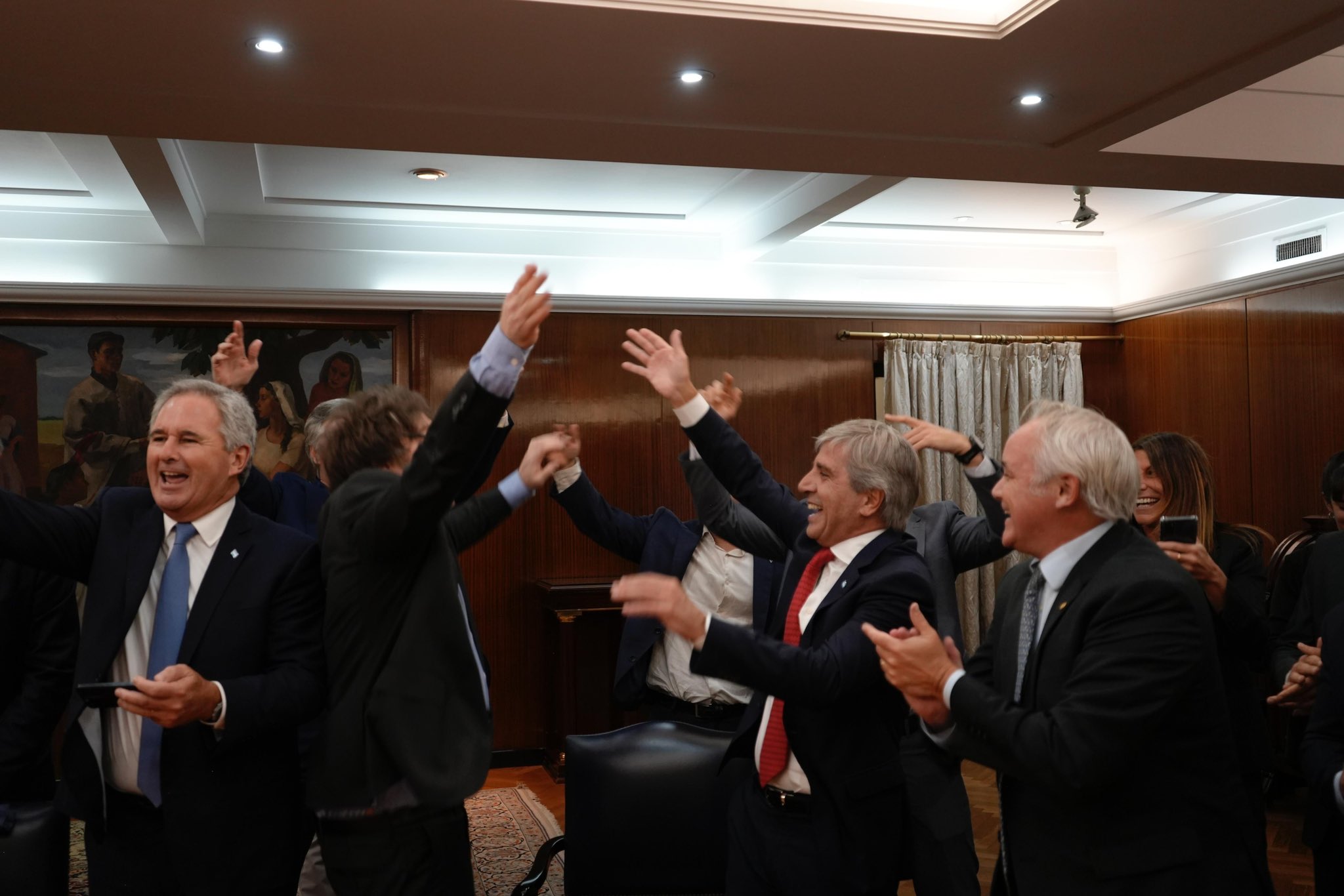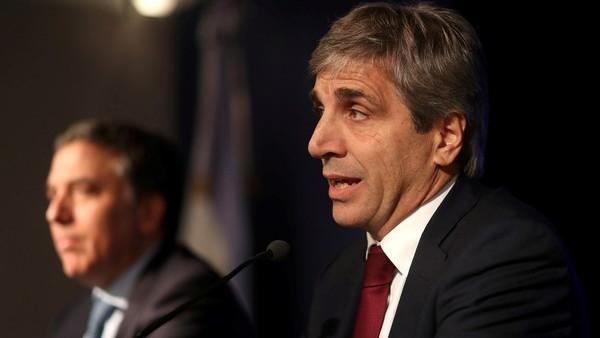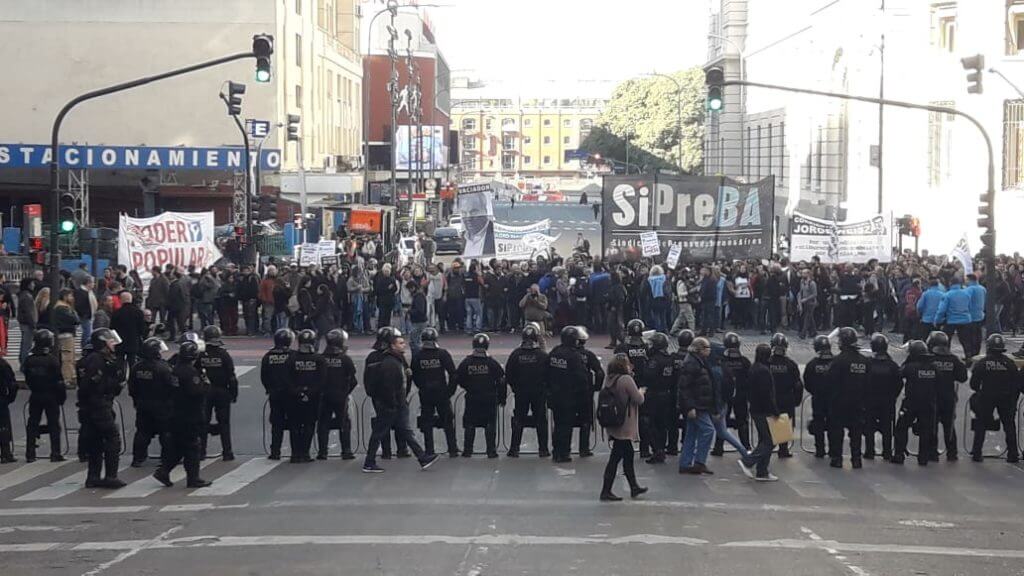Buenos Aires, Argentina — Decade-old monetary restrictions imposed on Argentinians were lifted on Monday following President Javier Milei’s administration’s announcement on April 11 that the government had signed a new agreement with the International Monetary Fund (IMF) — the third for Argentina in the past seven years.
After celebrating the deal (which includes $20 billion in new debt) last week, the president made a surprise announcement that the monetary restrictions — which include a cap on how many U.S. dollars can be purchased by Argentines per month and are commonly known as the “cepo,” or “clamp” — would be lifted.
The removal of the clamp system, which prevented people and companies from freely exchanging Argentine pesos and U.S. dollars, was hailed by the government as a milestone towards economic freedom.
The “cepo” was installed in October 2011 by then-President Cristina Fernández de Kirchner in an attempt to prevent currency devaluation and preserve Central Bank reserves. After failing to achieve either, the restrictions were lifted in December 2015 under President Mauricio Macri, who promoted more market-friendly policies.
Macri faced a financial crisis starting in 2018 that led him to request the International Monetary Fund’s largest program to date — a $57 billion stand-by agreement. However, after receiving $44 billion and failing to curb inflation, Macri lost his reelection bid in 2019. His defeat deepened the economic crisis and forced him to reimpose the “cepo.”
Beginning in 2019, President Alberto Fernández and his cabinet negotiated a new IMF deal while pushing for lower interest rates on Argentina’s debt. The Peronist government tightened the “cepo” further and, unable to finance public spending through new borrowing, turned to printing money — a move that contributed to 211% annual inflation in 2023.
Milei, a libertarian and self-proclaimed anarchocapitalist, campaigned on a promise to eliminate the “cepo” on his first day in office and to shut down Argentina’s Central Bank. But he later adopted more orthodox economic policies, focusing on reducing the fiscal deficit to lower inflation.
After managing to curb spending in the first half of 2024, Milei’s program struggled to rebuild Central Bank reserves, which had been depleted by the previous administration. Critics blamed the “cepo” and other policies that helped the government control the exchange rate and were used as tools to fight inflation — now projected at an annual rate of 55,9%.

While Milei’s economic team vowed to stay the course and said no changes would be made to the program, their policies came under heavy criticism in the early months of 2025.
The president and his Economy Minister, Luis Caputo, gave several interviews to dispel the notion that the peso was overvalued against the dollar. At the same time, negotiations began with IMF staff for a new deal. In the U.S., Donald Trump’s election was seen as a positive sign by libertarians, and Republican leaders voiced support for Argentina’s economic vision and request for new debt.
Negotiations accelerated between late March and early April, as Central Bank reserves came under further pressure and Minister Caputo acknowledged that the “crawling peg” (a controlled monthly 1% devaluation of the peso) would soon come to an end.
The IMF would approve of Argentina’s proposal but requested a higher exchange rate to protect the $20 billion loan.
In the end, Milei’s economic team presented a plan in which the exchange rate would float freely between 1,000 and 1,400 pesos per dollar.
The restrictions that had prevented individuals from freely purchasing dollars were lifted, as long as the transactions are made with funds held in bank accounts. Cash purchases remain limited to $100 per month.
Companies, however, will continue to face limitations for now. They are allowed to pay for imports and send dividends abroad freely, but only with earnings generated starting in 2025. Preexisting debts will be settled using a bond known as Bopreal.
The new flotation system debuted on April 14. Despite fears that the exchange rate might approach the 1,400-peso ceiling, the dollar closed the trading day at 1,230 pesos — a result celebrated by the government.
The Central Bank, however, was unable to purchase reserves, which it can only do when the rate nears the 1,000-peso floor, and hit a new 14-month low.
“This time it’s different”
The end of the “cepo” was hailed by Milei as a milestone in economic freedom. On April 11, following Minister Caputo’s announcement of the new IMF deal, the president delivered a short speech celebrating the success of his program.
“Never in the past 120 years have we had fiscal, monetary and exchange discipline; this is the first time. Don’t say you have already seen this, because this time truly it’s different,” Milei said in a recorded message.
Several cabinet members echoed the message, emphasizing the fiscal surplus achieved under the current program — a key element missing in previous liberal economic plans, including former President Macri’s.
In recent days, the president spent much of his time publicly criticizing economists, politicians and journalists, whom he compared to mandrills in a metaphor he described as “untranslatable.” A photo posted by Milei’s office featuring a coffee mug labeled “leftist tears” went viral on Monday.
While most economists welcomed the end of the “cepo,” the new program has not been free of criticism.
Many specialists warned that liberalizing the exchange rate could drive up prices — as reflected by a rise in monthly inflation to 3.7% in March, up from 2.4% in February.
Opposition leader Macri said lowering inflation “is not as easy as previously thought,” blaming the challenge on the “inheritance” left by the previous Peronist government. “Maybe the president was a little too enthusiastic, but this will help all of us become more humble,” he said.
Others criticized the government for the timing of the decision. “They took too long — it could have been done last year,” said former Economy Minister Hernán Lacunza, who added that “this is not the best political moment,” with legislative elections just six months away.
As it is now usual with critics of libertarian policy, Lacunza was later called a “liar” and a peddler of “cheap gossip” by Milei in a post on X.










